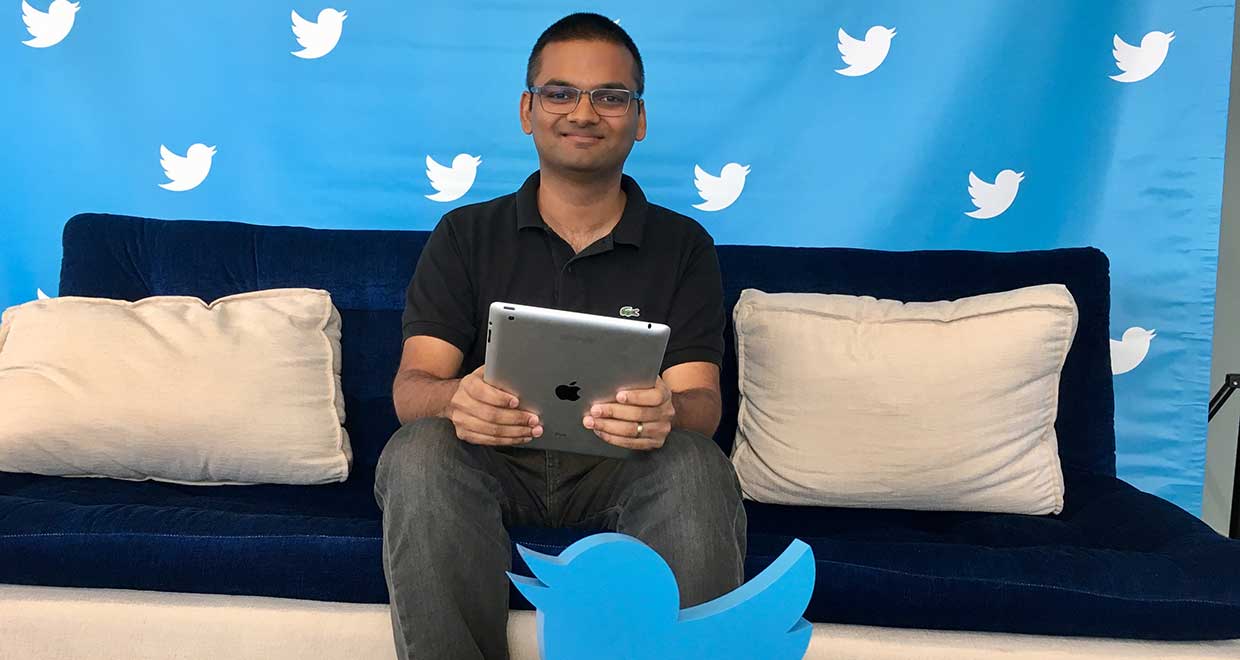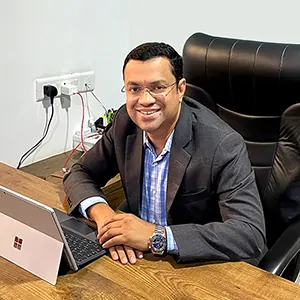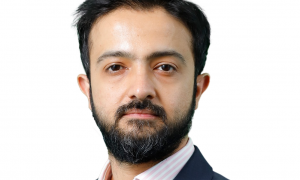Chaitanya graduated from NLSIU in 2009. After a successful stint at Clifford Chance LLP, he went on to pursue his Masters at Stanford Law School, with a specialisation in Law, Science and Technology. He is currently Legal Counsel (India) at Twitter, where his role entails managing litigation in courts throughout India, drafting and negotiating commercial agreements for all Twitter products, services and partnerships, advising on Intellectual Property, Privacy and Data Protection law, developing and enforcing robust corporate governance policies, and developing and delivering training programs on Twitter policies and processes for both internal and external audiences.
In this interview we speak to him about:
- His time at NLSIU
- Marrying law with technology
- His experience at Twitter
What would you like to say to our readers in the manner of an introduction of yourself?
I’m a technology lawyer and work for Twitter, where I lead the Legal function in India.
What inspired you to take up law?
I was always interested in computers and technology, so as a senior school student I did briefly consider engineering. But I noticed that hardly anyone I saw studying engineering in India actually ended up becoming an engineer; the “engineers” all seemed to end up in finance, consulting, management, or pretty much anything other than actual engineering. So I quickly realized that it wasn’t for me. Around the same time (this would have been around the 10th standard), I started to become interested in law, largely owing to interesting and vigorous debates in the media about the controversial laws of the time (the Prevention of Terrorism Act being a notable one). I also knew a few seniors who had been admitted to the five-year law programs, and their accounts of law school life sounded very appealing to me! I’m not a first-generation lawyer, but my family was quite supportive.
Tell us a bit about your time studying law at NLSIU.
I have fond memories of my five years at NLSIU. I wasn’t particularly fixated on academics to be honest; it was the non-academic pursuits that captured my imagination. Quizzing was foremost – I have always been a quizzer, and NLSIU has a very rich tradition of quizzing. It was an honour to have been part of that tradition, and to have been part of Bangalore’s quizzing scene, which is India’s finest. Another interest that developed at NLSIU was writing – I wrote a few articles on technology law, and was involved with the publication of the Indian Journal of Law and Technology (IJLT) in its formative years. I also spent a LOT of time listening to music and discovering new artists and genres! Looking back, it was a fun, relaxed time when I was mostly free to explore whatever interested me.
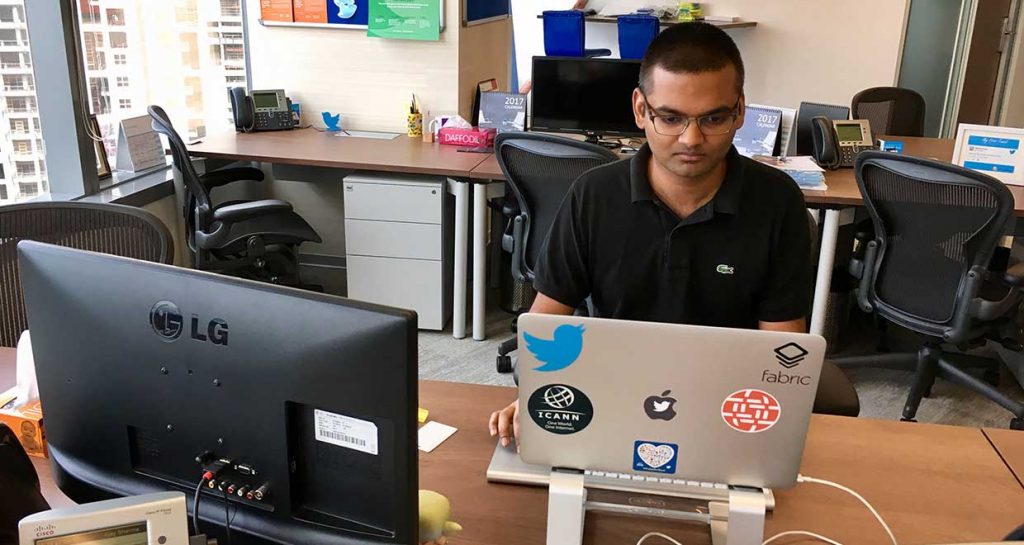
Could you tell us about the internships you took up, and what you learnt from those experiences?
I don’t think I was very serious about my internships. I did one per year, which was the minimum amount required. Three of those were litigation internships in Delhi, where I experienced every level of practice from trial up to the Supreme Court. While I worked with some truly accomplished and supportive seniors, I realized that litigation as a career wasn’t for me. I didn’t enjoy the chaos and wastage of time that are an inescapable part of the day-to-day practice of litigation in India, nor did I see myself thriving in the increasingly aggressive milieu of the Bar. So more than anything else, my internship experiences steered me away from a potential career path – not that that’s necessarily a bad thing!
What advice would you give students in avoiding a decision paralysis?
Go with your gut. If you are reasonably engaged with what’s happening at law school, you should find your inclinations emerging naturally during the five years. As you learn what interests you, seek out more research, writing or internship opportunities in that field, and if you can, reach out to people in the field to learn more about what they do. Perhaps most importantly – don’t do something just because other people are doing it. That’s probably the single worst reason to do anything.
Tell us about your early professional experiences at Clifford Chance LLP.
The transition was difficult. In addition to the transition from student life to working life, I also had to contend with the transition from India to a completely new culture. But my main motivation in signing on with Clifford Chance was to experience living and working overseas, so I met the challenge willingly. What appealed most to me about the big London law firms was that all trainees are required to rotate through three or four practice areas in the first two years, which gives you a pretty comprehensive overview of legal practice when you’re fresh out of law school. I also got the chance to spend half a year in Brazil on secondment, which was a fantastic experience. These experiences built my confidence in being able to do business across borders and cultures, which is central to what I do today. In retrospect, another thing I appreciate about these early experiences is that one tends to develop good working habits in the type of demanding work environment that firms like Clifford Chance offer, and these stay with you later, even if you eventually choose to move on to something different.
Did you have a mentor or guide during the formative years of your career?
I didn’t have a mentor, which I suppose isn’t surprising because I became interested in technology law when it was a brand-new, mostly unknown field, and nobody was making a career out of it, at least in India. It really took off in India only about five years ago, and today there’s no shortage of people in the field whom law students can seek out for guidance. Based on my experiences, I don’t think it’s necessary to have a mentor. What’s important is getting to know yourself and what makes you tick, and creating opportunities for yourself. A strong drive and quality work product will help you get noticed. I’ll also add that I’ve been very fortunate to have had some extremely supportive bosses at every stage of my career – at Clifford Chance, Amarchand Mangaldas, and now at Twitter – who have encouraged me to follow my chosen path and provided sound advice when I needed it.
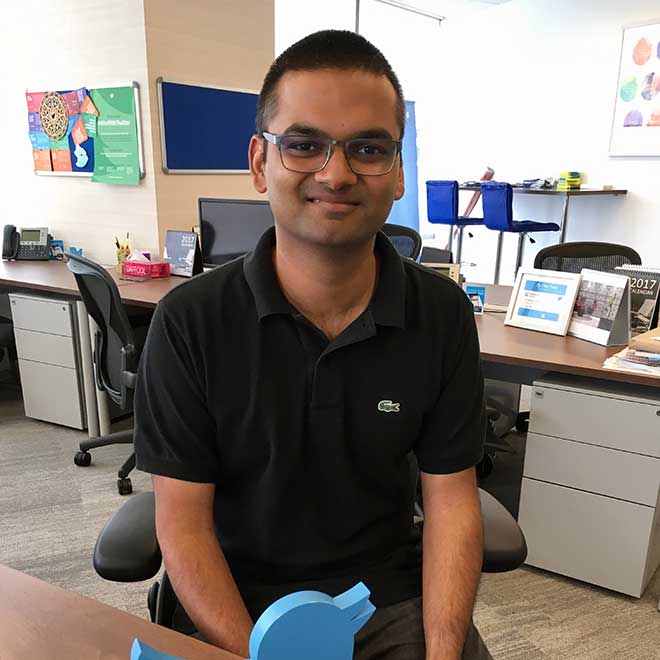
What motivated you to pursue an LL.M?
Two things. The first was that I knew relatively early in my law school career that I wanted to make a career out of technology law, and a specialized degree seemed like a good way of embarking on that path. The second was that I wanted to experience a foreign academic culture and learn from the world’s leading minds.
How did you keep up with the challenging academic rigor at Stanford?
I think attending Stanford has been the single most important decision that I’ve taken in my career to date. “Rigor” is the right word – the LL.M. was a very demanding course for me. But staying motivated was never a problem; US law schools allow you to design your own LL.M. program, so I was only taking courses that I was genuinely interested in. “All killer, no filler!” In fact, the real problem at Stanford was that I was interested in more courses than I could realistically take during the LL.M. year, so deciding which courses not to take was a conundrum. Stanford Law School allows you to take courses outside the law school as well, so for the first time in my life I was able to experience a bit of non-legal higher education! Another standout part of the Stanford experience was that my professors were all world-renowned authorities in their field, and my fellow students were an extremely accomplished bunch, so the classroom environment was excellent. That encouraged me to put in the work to be able to come into the classroom and hold my own, day after day.
How would you compare your LL.M experience with your under grad legal education in India?
The difference is stark. The pedagogical cultures are fundamentally different. Five-year law schools in India are focused on classroom teaching. The vast majority of your time as a student in a US law school is spent in self-study, and you come into the classroom to both refine and question what you have learned on your own. US law schools make huge demands on your time with respect to reading, and focus much more on primary materials including case law and statutes. This helps greatly with the transition from studying to practice, as knowing your way around a judgment or statute is such a fundamental skill in practice.
How did you come to work with Amarchand Mangaldas?
Having tossed my hat over the wall of technology law, I wanted to work with a practice that would allow me to specialize in this field. The team at Shardul Amarchand Mangaldas (which was still AMSS at the time I joined) was in the process of building out their technology practice (which was then housed within the policy and regulatory practice), and I saw this as a good opportunity to start the next phase of my career. Over two years at SAM, I got to do some very interesting work with a client base that included some of the world’s leading tech companies, and was also exposed to industry bodies and Internet institutions like ICANN and ISOC, which I remain engaged with today. I also had two incredibly supportive bosses in Mr. Shardul Shroff and Mr. Sandip Beri, who encouraged me to pursue my chosen path and gave me the opportunity to prove myself.
How do you deal with the massive challenges of representing one of the most important social networking sites world over?
(Chaitanya is Twitter’s first Counsel in India.)
It never gets boring, that’s for sure! Twitter is a unique place, and I never cease to be amazed by the ways in which our users are constantly reinventing how they use our platform; to joke, to speak up (or speak out), to connect with like minded strangers, to share information at the speed of light, to stay connected with what’s happening in the world. I often have to deal with difficult legal issues where the law provides little to no guidance and there’s no ready solution, which is precisely the kind of challenge I thrive on. It’s also a privilege to work for a company that shares my own values – that free speech is valuable and worth defending. I always find my work engaging due to the inherent nature of Twitter; the legal issues I encounter are closely connected to current events in India and beyond. When work gets especially demanding, I stay motivated by remembering that what we are doing is giving every person in the world a voice –an idea that has gone from being absolutely unthinkable to indispensable reality within my own lifetime. That’s powerful stuff.
On what parameters do you choose the projects you work on?
These days, as an in-house lawyer, I don’t have much room to choose – I have to deal with whatever crosses my desk! Though as someone who has always wanted to work in tech, I find most issues I come across at Twitter very interesting. In previous roles, I definitely tried to build up a corpus of work in my chosen field, and was fortunate enough to have access to clients that offered exactly the type of work that I wanted to do. I’ve learned that you must proactively seek out the type of work that you want to do – don’t count on it finding you. While fresh-faced graduates may not have a huge amount of choice right off the bat, this becomes easier to do with more experience.
Could you take us through a typical working day at your office?
I don’t think I’ve had a single day at Twitter that has gone perfectly according to plan! Nevertheless, to give you a representative example, I typically start work early and catch up on my inbox and the news. I try and reserve technical work like marking up an agreement or reviewing a litigation draft for this time of the day, when I’m at my freshest. I may have a Hangout scheduled for mid-morning with one of my internal business clients, where I’ll bring them up to speed on the current status of their ongoing deals, and learn about other deals that are in the pipeline. I may then move on to reviewing requests from various parts of the company that I need to approve; these could be anything from supplier contracts to press releases to creatives for an upcoming ad campaign on the platform. While my colleagues and I always talk about having a sit-down lunch at one of the many restaurants nearby, this mostly remains a pipe dream, and I usually only have time to grab something from one of my favourite shops or food trucks and catch up on Twitter or The Economist. Post-lunch, I may have a regular Hangout scheduled with one of my international counterparts in the Legal organization, after which I’ll usually try and check off the remainder of my list of goals for the day – perhaps complete a piece of legal research, respond to a customer or internal client, or work on an internal company policy or process that’s being updated. I’ll then try and beat the notorious NCR traffic on my way back home, where I’ll resume attacking my list and catch up on my inbox. Later that night, I may have a cross-time zone call with our headquarters team and outside counsel to set our strategy and prepare for an upcoming court hearing. I’ll hopefully end the day feeling that, while not everything may have gone to plan (there are always surprises and emergencies that you can’t account for), I made meaningful progress on my goals for the week.
What books, judgements that you have read would you say have played an integral role in shaping your legal philosophy?
I’d say my philosophy has been strongly influenced by the writings of three lawyer-statesmen: Thomas Jefferson, for his conception of individual liberties and their central role in society as well as his mastery of the written word; Jawaharlal Nehru, whose idealism and clarity of purpose shone through vividly in his writings; and Lee Kuan Yew, whose warnings about the essential fragility of civilization and the dangers of populism seem especially prescient in 2017.
With respect to my day-to-day work, a book that has influenced me greatly is High Performance with High Integrity by Ben Heineman, which I was introduced to as a student at Stanford. It is essential reading for in-house counsel, and I strongly recommend it to anyone who is interested in this line of work.
What are the key attributes that one must develop in order to excel in this industry?
I think the key skill for in-house lawyers is being a good listener. The outcome that we are always pursuing is helping our business colleagues achieve their goals while simultaneously protecting the interests of the company. Listening well helps you identify potential risks and ask the right questions. An added benefit is that it helps you learn something new every day, especially at a large, diverse company where you’re surrounded by colleagues working on amazing stuff that’s well outside your comfort zone as a lawyer. The only way to develop this skill is to practice it everyday.
How do you manage your time between your professional and personal interests?
I’ve learned that you have to make the time for the things you value in life – no one’s going to hand it to you. Music is my first love; when I’m not at work you’ll probably find me playing or tinkering with one of my guitars.
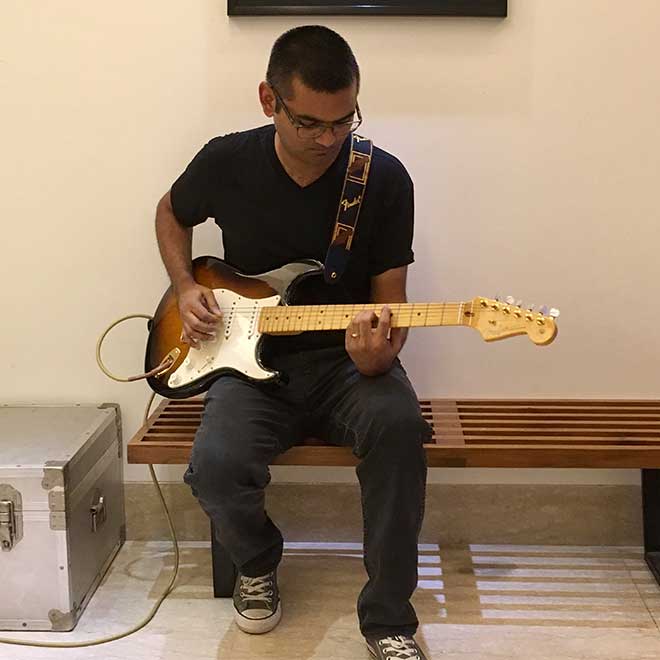
How do you keep yourself updated about the latest developments in law?
On Twitter!
What advice would you like to give our readers, who are mostly law students and young lawyers?
I don’t know how qualified I am to give advice, but since you’ve given me a soapbox, I’d encourage anyone reading this to be original and follow their own interests within (or outside) the law, wherever they may lead. I often turn to a great quote by Phil Knight that has pride of place outside the Stanford Graduate School of Business: “There comes a time in every life when the past recedes and the future opens. It’s that moment when you turn to face the unknown. Some will turn back to what they already know. Some will walk straight ahead into uncertainty. I can’t tell you which one is right. But I can tell you which one is more fun.”

